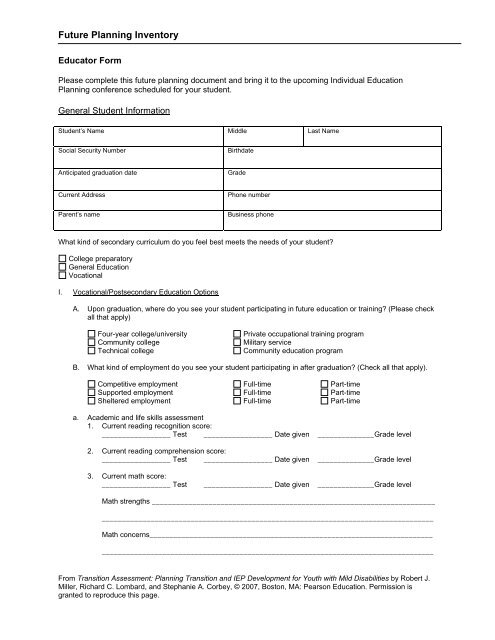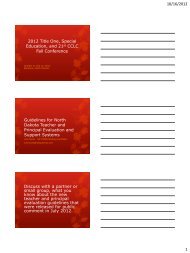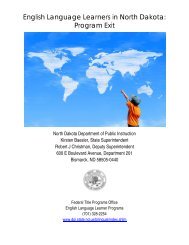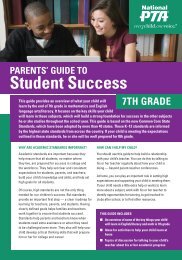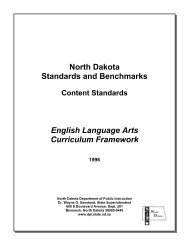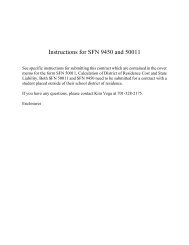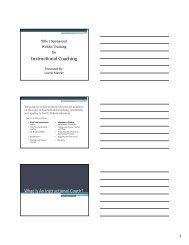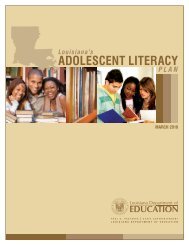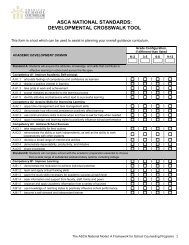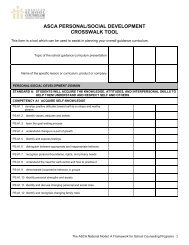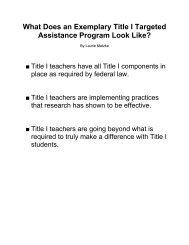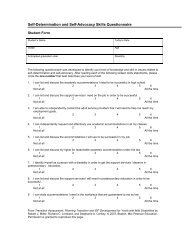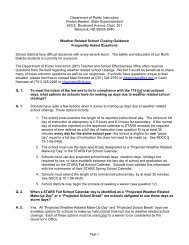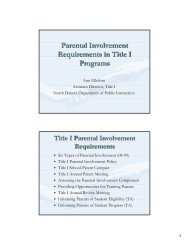Future Planning Inventory Forms
Future Planning Inventory Forms
Future Planning Inventory Forms
You also want an ePaper? Increase the reach of your titles
YUMPU automatically turns print PDFs into web optimized ePapers that Google loves.
<strong>Future</strong> <strong>Planning</strong> <strong>Inventory</strong><br />
Educator Form<br />
Please complete this future planning document and bring it to the upcoming Individual Education<br />
<strong>Planning</strong> conference scheduled for your student.<br />
General Student Information<br />
Student’s Name Middle Last Name<br />
Social Security Number<br />
Birthdate<br />
Anticipated graduation date<br />
Grade<br />
Current Address<br />
Phone number<br />
Parent’s name<br />
Business phone<br />
What kind of secondary curriculum do you feel best meets the needs of your student?<br />
College preparatory<br />
General Education<br />
Vocational<br />
I. Vocational/Postsecondary Education Options<br />
A. Upon graduation, where do you see your student participating in future education or training? (Please check<br />
all that apply)<br />
Four-year college/university<br />
Community college<br />
Technical college<br />
Private occupational training program<br />
Military service<br />
Community education program<br />
B. What kind of employment do you see your student participating in after graduation? (Check all that apply).<br />
Competitive employment Full-time Part-time<br />
Supported employment Full-time Part-time<br />
Sheltered employment Full-time Part-time<br />
a. Academic and life skills assessment<br />
1. Current reading recognition score:<br />
_________________ Test _________________ Date given ______________Grade level<br />
2. Current reading comprehension score:<br />
_________________ Test _________________ Date given ______________Grade level<br />
3. Current math score:<br />
_________________ Test _________________ Date given ______________Grade level<br />
Math strengths ______________________________________________________________________<br />
__________________________________________________________________________________<br />
Math concerns______________________________________________________________________<br />
__________________________________________________________________________________<br />
From Transition Assessment: <strong>Planning</strong> Transition and IEP Development for Youth with Mild Disabilities by Robert J.<br />
Miller, Richard C. Lombard, and Stephanie A. Corbey, © 2007, Boston, MA: Pearson Education. Permission is<br />
granted to reproduce this page.
4. Life skills curricula:<br />
Areas of strengths ___________________________________________________________________<br />
__________________________________________________________________________________<br />
Areas of concern____________________________________________________________________<br />
__________________________________________________________________________________<br />
5. Student level of motivation high medium low<br />
Student locus of control high medium low<br />
Ability of student to self-advocate high medium low<br />
II.<br />
Home Living Options<br />
A. Where do you think the student will likely live after graduation?<br />
Live independently in apartment or home<br />
With family member (who?)<br />
__________________________________<br />
With support<br />
Supervised apartment (which one?) __________________________________<br />
Group home (which one?)<br />
__________________________________<br />
College dormitory (where?)<br />
__________________________________<br />
Other, please describe<br />
__________________________________<br />
III. Recreational and Leisure Options<br />
A. In which extracurricular activities would you like to see the student participate during high school?<br />
______________________________________________________________________________________<br />
______________________________________________________________________________________<br />
______________________________________________________________________________________<br />
Does your student need any specific supports or accommodations to participate in this/these extracurricular<br />
activities? Yes No<br />
If yes, please describe:___________________________________________________________________<br />
______________________________________________________________________________________<br />
B. <strong>Future</strong> Leisure Activities<br />
Please list all the community leisure activities in which you hope your student will choose to participate after<br />
high school.<br />
______________________________________________________________________________________<br />
______________________________________________________________________________________<br />
______________________________________________________________________________________<br />
Does your student need any specific supports or accommodations to participate in this/these leisure<br />
activities? Yes No<br />
If yes, please describe: ___________________________________________________________________<br />
From Transition Assessment: <strong>Planning</strong> Transition and IEP Development for Youth with Mild Disabilities by Robert J.<br />
Miller, Richard C. Lombard, and Stephanie A. Corbey, © 2007, Boston, MA: Pearson Education. Permission is<br />
granted to reproduce this page.
IV. Transportation Options<br />
How will your student get around the community<br />
and to work?<br />
drive own vehicle<br />
drive family vehicle<br />
use city bus transportation<br />
take taxi<br />
ride bicycle<br />
walk<br />
use special regional transportation system<br />
(i.e., bus between towns)<br />
depends on others<br />
other ____________________________<br />
Does Now<br />
Needs to Learn<br />
V. Financial Support<br />
A. Which of the following agencies need to be contacted regarding transition planning and financial assistance<br />
for your student?<br />
Not applicable<br />
Division of Rehabilitation Services (DRS)<br />
Local Job Training Agency<br />
Social Security office<br />
County social services<br />
Other, please describe ____________________________________________________________________<br />
VI. Currently, what is your greatest concern for future of your student?<br />
_________________________________________________________________________________________<br />
_________________________________________________________________________________________<br />
_________________________________________________________________________________________<br />
_________________________________________________________________________________________<br />
From Transition Assessment: <strong>Planning</strong> Transition and IEP Development for Youth with Mild Disabilities by Robert J.<br />
Miller, Richard C. Lombard, and Stephanie A. Corbey, © 2007, Boston, MA: Pearson Education. Permission is<br />
granted to reproduce this page.
<strong>Future</strong> <strong>Planning</strong> <strong>Inventory</strong><br />
Student Form<br />
What are your plans during high school and after graduation? Please complete this future planning document and<br />
bring it to your next Individual Educational <strong>Planning</strong> conference.<br />
General Student Information<br />
Student’s Name Middle Last Name<br />
Social Security Number<br />
Birthdate<br />
Anticipated graduation date<br />
Grade<br />
Current Address<br />
Phone number<br />
Parent’s name<br />
Business phone<br />
What kinds of courses do you want to take during high school? (Be sure you choose the kind of coursework that will<br />
meet your future planning goals!)<br />
College preparatory<br />
Vocational<br />
General education (Minimum graduation requirements)<br />
I don’t know<br />
I. Vocational/Postsecondary Education Options<br />
C. Upon graduation, I want to go on for future education or training. Yes No<br />
If yes, please check each kind of postsecondary education or training that interests you.<br />
Four-year college/university<br />
Community college<br />
Technical college<br />
Private occupational training program<br />
Military service<br />
Community education program<br />
What do you want to study or train to be?<br />
______________________________________________________________________________________<br />
My level of motivation to succeed in the academic setting:<br />
high medium low<br />
The level of control I have over decision making and my individual success:<br />
high medium low<br />
My ability to identify what I need and how to get it:<br />
high medium low<br />
D. Upon graduation, I am going to get a job right away.<br />
Yes<br />
No<br />
If yes, please check the kind of job you expect to have.<br />
Competitive employment: Full-time Part-time<br />
Self-employment<br />
Supported employment: Full-time Part-time<br />
Sheltered employment: Full-time Part-time<br />
E. In what type of job/occupation will you will be working one year after graduation?<br />
______________________________________________________________________________________<br />
From Transition Assessment: <strong>Planning</strong> Transition and IEP Development for Youth with Mild Disabilities by Robert J.<br />
Miller, Richard C. Lombard, and Stephanie A. Corbey, © 2007, Boston, MA: Pearson Education. Permission is<br />
granted to reproduce this page.
F. In what type of job/occupation will you working in five years after graduation?<br />
______________________________________________________________________________________<br />
E. What courses do you need to take in high school this year that will help you attain your employment or<br />
postsecondary education goals?<br />
_____________________________________<br />
_____________________________________<br />
___________________________________________<br />
___________________________________________<br />
F. Do you want information on tests required to get into post-secondary education (e.g. ASVAB, SAT, ACT,<br />
PSAT)?<br />
G. What chores do you have at home and how much do you like to do them?<br />
Activity<br />
Degree of Independence<br />
(e.g. make bed, carry out trash: mow lawn)<br />
1. ________________________________<br />
2. ________________________________<br />
3. ________________________________<br />
4. ________________________________<br />
5. ________________________________<br />
Do it independently<br />
Need some help<br />
H. List jobs you do now and really enjoy.<br />
______________________________________________________________________________________<br />
I. What jobs or work experience have you had in your community?<br />
_____________________________________ ___________________________________________<br />
_____________________________________<br />
___________________________________________<br />
J. List any jobs you really dislike.<br />
_____________________________________<br />
_____________________________________<br />
___________________________________________<br />
___________________________________________<br />
II.<br />
Home Living Options<br />
A. Where do you plan on living after graduation? (Please check one from this list.)<br />
Large urban (100,000 population plus)<br />
Urban (30,000 to 100,000 population)<br />
Rural (under 30,000 population)<br />
Farm<br />
B. (Please check one from this list)<br />
Live independently in apartment or home<br />
With family member (who?)<br />
With support<br />
Supervised apartment (which one?)<br />
Group home (which one?)<br />
College dormitory (where?)<br />
Other, please describe<br />
What city? __________________________________<br />
What city? __________________________________<br />
What town? _________________________________<br />
___________________________________________<br />
___________________________________________<br />
___________________________________________<br />
___________________________________________<br />
___________________________________________<br />
___________________________________________<br />
From Transition Assessment: <strong>Planning</strong> Transition and IEP Development for Youth with Mild Disabilities by Robert J.<br />
Miller, Richard C. Lombard, and Stephanie A. Corbey, © 2007, Boston, MA: Pearson Education. Permission is<br />
granted to reproduce this page.
About the <strong>Future</strong> <strong>Planning</strong> <strong>Inventory</strong> for Parents/Guardians<br />
The following inventory has been designede to assist your son or daughter plan for his or her<br />
future after high school. For this planning to be successful, your son or daughter will need your<br />
help. Please fill out this inventory based on your own thoughts. Your son or daughter will<br />
complete his or her own <strong>Future</strong> <strong>Planning</strong> <strong>Inventory</strong>, as will his or her special education teacher.<br />
Bring your completed inventory to the next Individual Education <strong>Planning</strong> (IEP) meeting<br />
scheduled on __________________________. At that time we will discuss your young adult’s<br />
future plans and discuss how we can work together to make sure he or she attains these goals.<br />
Depending on the age of your child, some questions may be more timely than others. If you<br />
have any questions when you are filling out this form, leave the item blank and this item will be<br />
discussed at the meeting. If you completed this form last year, your previous form will be<br />
attached to this blank form for your reference when completing this year’s inventory.
<strong>Future</strong> <strong>Planning</strong> <strong>Inventory</strong><br />
Parent/Guardian Form<br />
Please complete this future planning document and bring it to the upcoming Individual Education <strong>Planning</strong><br />
conference scheduled for your son/daughter.<br />
General Student Information<br />
Student’s Name Middle Last Name<br />
Social Security Number<br />
Birthdate<br />
Anticipated graduation date<br />
Grade<br />
Current Address<br />
Phone number<br />
Parent’s name<br />
Business phone<br />
What kind of secondary curriculum do you feel best meets the needs of your son or daughter?<br />
College preparatory<br />
General education<br />
Vocational<br />
I. Vocational/Postsecondary Education Options<br />
A. Upon graduation, what do you see your son/daughter doing for future education or training? (Please check<br />
all that apply)<br />
Four-Year college/university<br />
Community college<br />
Technical college<br />
Private occupational training program<br />
Military service<br />
Community education program<br />
What will you son/daughter be studying or training to be?<br />
______________________________________________________________________________________<br />
My son’s/daughter’s level of motivation to succeed in the academic setting:<br />
high medium low<br />
The level of control my son/daughter believes he or she has over decision making and his/her individual<br />
success:<br />
high medium low<br />
My son’s/daughter’s ability to identify what he/she needs and how to get it:<br />
high medium low<br />
B. Upon graduation, in what kind of employment setting do you see your son/daughter engaged in?<br />
Competitive employment: Full-time Part-time<br />
Self-employment<br />
Supported employment: Full-time Part-time<br />
Sheltered employment: Full-time Part-time<br />
C. What type of job/occupation do you see your son/daughter working in one year after graduation?<br />
______________________________________________________________________________________<br />
From Transition Assessment: <strong>Planning</strong> Transition and IEP Development for Youth with Mild Disabilities by Robert J.<br />
Miller, Richard C. Lombard, and Stephanie A. Corbey, © 2007, Boston, MA: Pearson Education. Permission is<br />
granted to reproduce this page.
D. What type of job/occupation do you see your son/daughter working in five years after graduation?<br />
______________________________________________________________________________________<br />
E. What work-related demands are being placed on your son or daughter at home, and what is his or her<br />
reaction to them?<br />
Activity<br />
Degree of Independence<br />
(e.g. make bed, carry out trash: mow lawn)<br />
1. ________________________________<br />
2. ________________________________<br />
3. ________________________________<br />
4. ________________________________<br />
5. ________________________________<br />
Do it independently<br />
Need some help<br />
F. List any jobs or chores your son/daughter does now and enjoys.<br />
______________________________________________________________________________________<br />
______________________________________________________________________________________<br />
G. What jobs or work experience has your son/daughter had in your community?<br />
_____________________________________<br />
_____________________________________<br />
___________________________________________<br />
___________________________________________<br />
H. List any jobs your son/daughter seems to really dislike.<br />
_____________________________________<br />
_____________________________________<br />
___________________________________________<br />
___________________________________________<br />
II.<br />
Home Living Options<br />
C. Where do you plan on living after graduation? (Please check one from this list.)<br />
Large urban (100,000 population plus)<br />
Urban (30,000 to 100,000 population)<br />
Rural (under 30,000 population)<br />
Farm<br />
D. (Please check one from this list)<br />
Live independently in apartment or home<br />
With family member (who?)<br />
With support<br />
Supervised apartment (which one?)<br />
Group home (which one?)<br />
College dormitory (where?)<br />
Other, please describe<br />
What city? __________________________________<br />
What city? __________________________________<br />
What town? _________________________________<br />
___________________________________________<br />
___________________________________________<br />
___________________________________________<br />
___________________________________________<br />
___________________________________________<br />
___________________________________________<br />
From Transition Assessment: <strong>Planning</strong> Transition and IEP Development for Youth with Mild Disabilities by Robert J.<br />
Miller, Richard C. Lombard, and Stephanie A. Corbey, © 2007, Boston, MA: Pearson Education. Permission is<br />
granted to reproduce this page.
III. Recreational and Leisure Options<br />
A. Leisure Interest <strong>Inventory</strong><br />
Check all of the following leisure activities in which your son or daughter currently spends free time.<br />
Athletic/Sports Activities<br />
swimming liftingweights skiing<br />
running aerobics canoeing<br />
softball basketball riding motorcycle<br />
walking fishing camping<br />
riding bike bowling riding horses<br />
other__________________________________________<br />
Large Group Events<br />
movies<br />
car races<br />
ball games<br />
horse, dog, car shows<br />
music events<br />
community education classes<br />
other__________________________________________<br />
Individual Activities<br />
sewing listening to music Internet<br />
handcrafts cooking shopping<br />
reading playing instrument playing pool/billiards<br />
caring for pets writing letters caring for lawn<br />
talking on phone watching TV playing video games<br />
clean/repair car<br />
playing cards or board games<br />
other__________________________________________<br />
Social Activities<br />
dating entertaining at home attending church<br />
picnicking volunteering belonging to a social club<br />
eating out driving around spending time with family or friends<br />
dancing<br />
other_____________________________________________<br />
B. In which extracurricular activities would you like your son/daughter to participate during high school?<br />
______________________________________________________________________________________<br />
______________________________________________________________________________________<br />
______________________________________________________________________________________<br />
Does your son/daughter need any specific supports or accommodations to participate in this/these<br />
extracurricular activities? Yes No<br />
C. <strong>Future</strong> Leisure Activities<br />
Check any of the following leisure activity resources that are available in the community where you think<br />
your son/daughter will live following graduation:<br />
YMCA or YWCA bowling leagues recreation clubs, classes<br />
city/county/state parks movie sports arenas<br />
city recreation facilities church groups community education center<br />
other ____________________________________________<br />
From Transition Assessment: <strong>Planning</strong> Transition and IEP Development for Youth with Mild Disabilities by Robert J.<br />
Miller, Richard C. Lombard, and Stephanie A. Corbey, © 2007, Boston, MA: Pearson Education. Permission is<br />
granted to reproduce this page.
Please list all the community leisure activities in which you hope you son/daughter will choose to participate after high<br />
school.<br />
_____________________________________________________________________________________________<br />
_____________________________________________________________________________________________<br />
_____________________________________________________________________________________________<br />
Does your son/daughter need any specific supports or accommodations to participate in these leisure activities?<br />
Yes No<br />
If yes, please describe: __________________________________________________________________________<br />
IV. Transportation Options<br />
How will your son/daughter get around the<br />
Community and to work?<br />
drive own vehicle<br />
drive family vehicle<br />
use city bus transportation<br />
take taxi<br />
ride bicycle<br />
walk<br />
use special regional transportation system<br />
(i.e., bus between towns)<br />
depend on others<br />
other _________________________<br />
Does Now<br />
Need some help<br />
Are you willing to drive your son/daughter to work? Yes No<br />
How many miles? ______________________________________________________________________<br />
V. Financial Support<br />
A. Does your son/daughter need financial assistance in any of the following areas to reach his/her long-range<br />
goals?<br />
1. Postsecondary education Yes No<br />
If yes, please check all of the following for which you would like information.<br />
a. Division of Rehabilitation Services (DRS)<br />
b. Pell Grants<br />
c. Scholarships<br />
d. Work Study<br />
e. Student loans<br />
f. Supplemental Security Income (SSI)<br />
g. Social Security Disability Insurance (SSDI)<br />
2. Employment assistance Yes No<br />
If yes, please check all of the following for which you would like information.<br />
a. Division of Rehabilitation Services (DRS)<br />
b. Local Job Training Agency<br />
c. State Job Service<br />
d. Supplemental Security Income (SSI)<br />
e. County social services<br />
f. Rehabilitation centers<br />
From Transition Assessment: <strong>Planning</strong> Transition and IEP Development for Youth with Mild Disabilities by Robert J.<br />
Miller, Richard C. Lombard, and Stephanie A. Corbey, © 2007, Boston, MA: Pearson Education. Permission is<br />
granted to reproduce this page.
3. Home living assistance Yes No<br />
If yes, please check all of the following for which you would like information.<br />
a. County Social Services<br />
b. Supplemental Security Income (SSI/medical assistance)<br />
c. Housing assistance – city government<br />
d. Independent Living Center services<br />
B. Which of the following agencies have you contacted with regard to financial support for your son or<br />
daughter?<br />
Not applicable<br />
Division of Rehabilitation Services (DRS)<br />
Local Job Training Agency<br />
Social Security Office<br />
County Social Services<br />
Other, please describe _________________________________________________________________<br />
VI. Health-Related Needs<br />
A. When was the last physical examination completed for your son daughter? __________________________<br />
B. Does your son/daughter currently have any of the following needs?<br />
medical (i.e., mediations) yes* no<br />
counseling yes* no<br />
other _______________________________________________________________________________<br />
*Please explain _________________________________________________________________________<br />
C. What are some supports your son/daughter may require in the future?<br />
______________________________________________________________________________________<br />
______________________________________________________________________________________<br />
______________________________________________________________________________________<br />
VII. Currently, what is your greatest concern for your son/daughter’s future?<br />
_________________________________________________________________________________________<br />
_________________________________________________________________________________________<br />
_________________________________________________________________________________________<br />
From Transition Assessment: <strong>Planning</strong> Transition and IEP Development for Youth with Mild Disabilities by Robert J.<br />
Miller, Richard C. Lombard, and Stephanie A. Corbey, © 2007, Boston, MA: Pearson Education. Permission is<br />
granted to reproduce this page.


